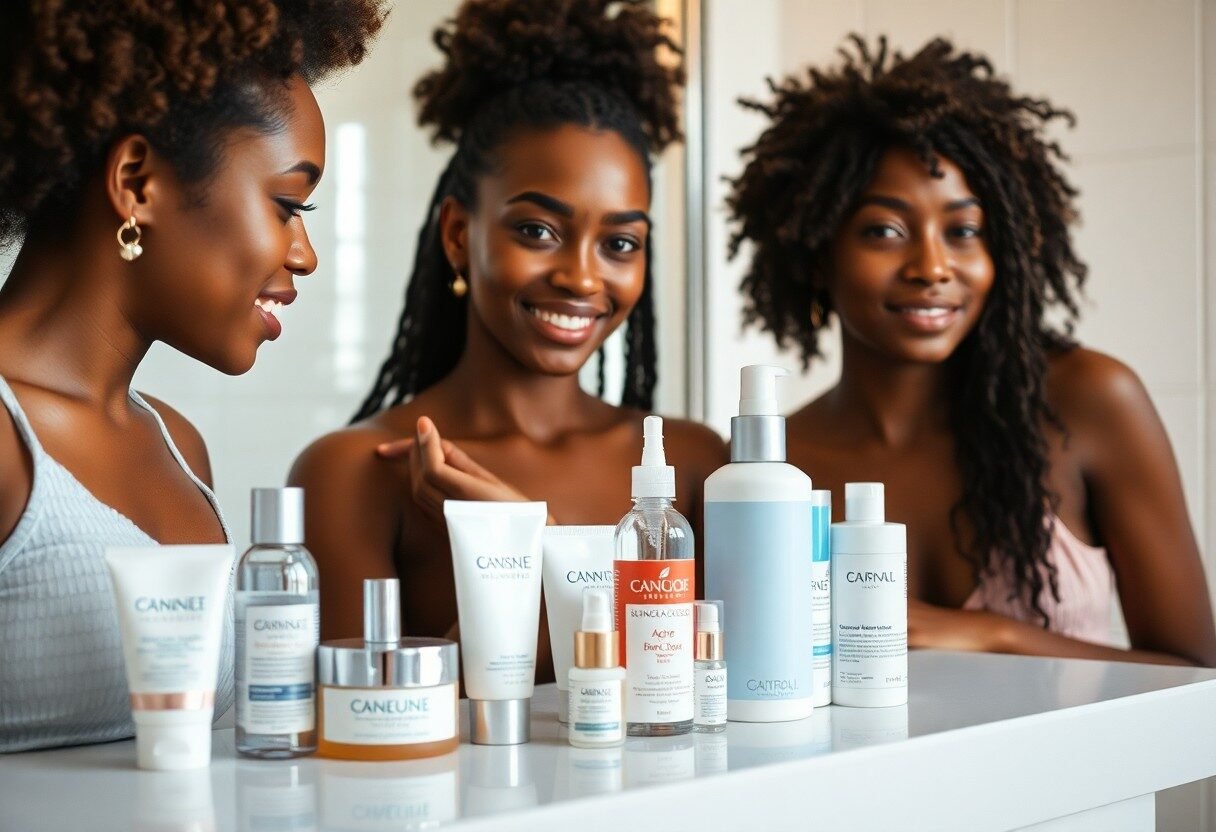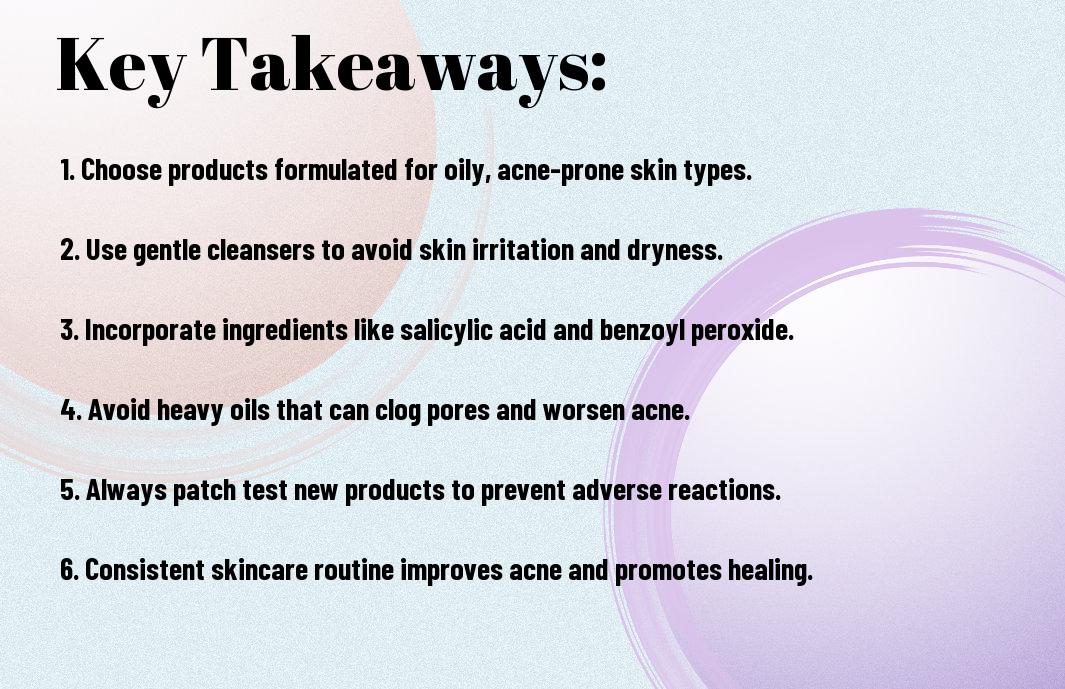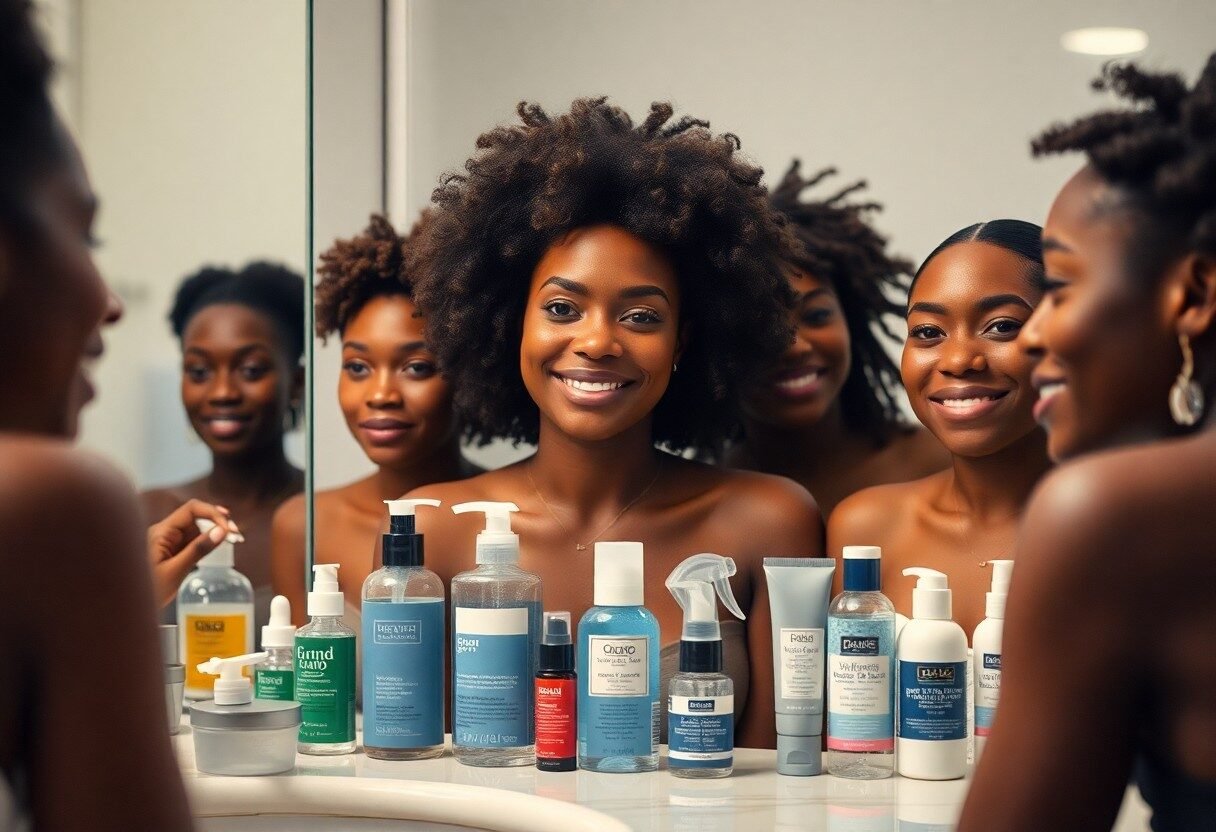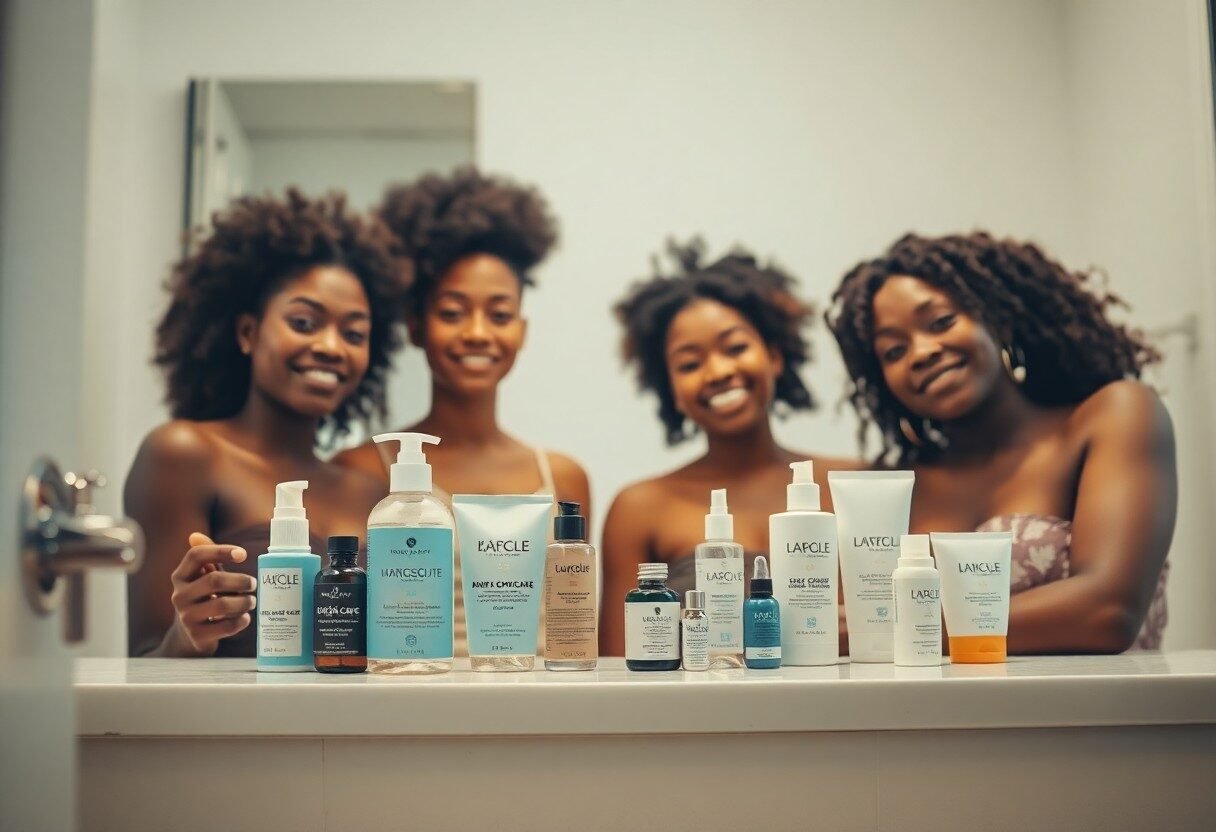
Many women of color face unique skincare challenges, particularly when it comes to acne and breakouts. As someone who has navigated these issues, I understand that finding the right products is necessary for your skin health. In this post, I’ll share effective skincare products designed specifically to address your needs, highlighting ingredients that work best for melanin-rich skin. Armed with the right information, you can take control of your skin’s health and achieve a clearer, more radiant complexion.
Key Takeaways:
- Look for non-comedogenic products to prevent clogged pores, which can lead to breakouts.
- Incorporate salicylic acid into your routine as it helps to exfoliate and clear acne-prone skin.
- Consider products with benzoyl peroxide for its antibacterial properties, effective in reducing acne bacteria.
- Use gentle chemical exfoliants like AHAs or BHAs to promote skin cell turnover without irritation.
- Hydration is key; opt for oil-free moisturizers that won’t contribute to breakouts.
- Sun protection is necessary; choose a broad-spectrum sunscreen that is suitable for acne-prone skin.
- Patch-test new products to avoid adverse reactions, especially for sensitive skin types.

The Unique Challenges of Acne in Black Women
Cultural Misunderstandings of Acne
Cultural perceptions of beauty often overlook the reality of acne in Black women, leading to misunderstandings and stigmatization. Many believe that acne only affects teens, but in reality, I know women of all ages struggle with breakouts. This lack of representation in media and conversations can make it harder for us to find relatable solutions and feel supported in our skincare journeys.
Impact of Skin Type and Tone on Breakouts
Black women’s skin tends to have a unique composition and structure that influences breakout patterns. I’ve noticed that the oil production, moisture retention, and thickness can vary widely, affecting how my skin reacts to different products. For example, my skin might be more prone to certain types of breakouts than others, even if I’m using generally effective treatments.
African-American skin can be more prone to hyperpigmentation, which means that even mild acne may leave behind dark spots that take longer to fade. This is due to the higher melanin content in our skin, often resulting in post-inflammatory hyperpigmentation after a breakout heals. So, alongside treating the acne itself, it’s necessary for me to focus on prevention strategies and products that minimize discoloration after the fact. A gentle healing approach, particularly with ingredients like niacinamide and vitamin C, will help maintain my skin tone and improve the overall appearance of my skin as I navigate breakouts. Understanding this allows me to be more proactive in my skincare routine rather than reactive, which can lead to a cycle of frustration and low confidence.
Ingredients that Empower: Active Components to Seek
Salicylic Acid: The Oil-Clearing Hero
Known for its incredible ability to penetrate the pores, salicylic acid works wonders in reducing excess oil and preventing breakouts. This beta hydroxy acid (BHA) gently exfoliates the skin, enabling cell turnover while keeping those troublesome sebaceous glands in check. For those of us with oily or acne-prone skin, incorporating this ingredient can make a significant difference.
Benzoyl Peroxide: A Potent Antibacterial Agent
Benzoyl peroxide stands out as an effective treatment for acne, tackling the bacteria that cause breakouts. This powerhouse ingredient provides deep cleansing action, penetrating the skin to kill the acne-causing bacteria, making it an imperative component in many formulations aimed at controlling severe acne. Regular use can lead to clearer skin and fewer breakouts.
In studies, benzoyl peroxide has been shown to reduce acne lesions significantly, often in just a matter of weeks. For me, consistency is key; applying products containing this ingredient as directed has helped keep stubborn blemishes at bay. Just be cautious with concentrations—higher percentages can lead to dryness or irritation, especially for your skin.
Niacinamide: The Anti-Inflammatory Superstar
Niacinamide, also known as vitamin B3, is another ingredient I find indispensable in my skincare routine. It works effectively to reduce inflammation and redness associated with breakouts, helping my skin appear more balanced and even-toned. Additionally, niacinamide supports the skin barrier, which is vital for overall skin health.
What makes niacinamide particularly unique is its ability to regulate oil production while simultaneously calming the skin. Research indicates that it can reduce the appearance of enlarged pores and even minimize the depth of acne scars over time. In my experience, integrating niacinamide has transformed my routine, providing that soothing touch to problematic skin without overwhelming it. Aim for products with 5% to 10% concentration for effective results.
Formulations That Nurture While They Heal
Gel-Based Products: Lightweight and Non-Comedogenic
Gel-based products are an excellent choice for acne-prone skin, particularly for those of us with oily skin types. These formulations are lightweight and often contain water as a primary ingredient, allowing them to hydrate the skin without feeling heavy. Importantly, they are non-comedogenic, meaning they won’t clog pores, making them ideal for fighting breakouts while still providing necessary moisture.
Oil-Free Moisturizers: Hydration Without Clogs
Finding the right moisturizer can feel challenging, but oil-free moisturizers strike the perfect balance between hydration and preventing breakouts. These products provide necessary moisture without introducing excess oil, which can exacerbate acne. Formulations containing hyaluronic acid or glycerin deliver hydration while remaining lightweight, ensuring your skin feels fresh and balanced, not greasy.
Oil-free moisturizers typically feature oil-free emollients and humectants that deliver hydration without the risk of clogging pores. Options like Neutrogena Hydro Boost Gel-Cream or Cetaphil Moisturizing Lotion are fabulous examples. They use gel-like textures that absorb quickly, allowing your skin to feel hydrated and plump rather than oily. Additionally, many contain soothing ingredients like aloe vera and chamomile to help calm inflammation, which is particularly beneficial for acne-prone skin. By choosing products specifically designed for your skin type, you can maintain a healthy moisture balance while effectively managing acne.
Natural Remedies with a Scientific Twist
Tea Tree Oil: Nature’s Acne Fighter
Known for its strong antibacterial properties, tea tree oil is a powerful option for combating acne. Research has shown that this natural remedy can significantly reduce the number of acne lesions. When I apply diluted tea tree oil directly to blemishes, I often notice a reduction in inflammation and redness within a day or two, making it a staple in my skincare regimen.
Aloe Vera: Soothing And Healing Properties
Aloe vera is renowned for its ability to hydrate and soothe irritated skin, but its benefits extend to acne treatment as well. The gel from the aloe vera plant contains anthraquinones, compounds that have anti-inflammatory and antibacterial properties, providing relief from redness and promoting healing. As a natural remedy, it’s a great choice for your skincare arsenal.
In my experience, applying pure aloe vera gel not only calms active breakouts but also helps prevent future ones. Studies indicate that aloe vera can enhance the skin’s healing process, with its ability to assist in cell regeneration. Additionally, its high water content means it hydrates without clogging pores—a perfect balance for acne-prone skin. Overall, incorporating aloe vera into your routine can improve hydration while providing a soothing effect on inflammation and irritation.

The Importance of Sun Protection in an Acne-Fighting Regimen
SPF: A Non-Negotiable in Skincare
In the fight against acne, incorporating SPF into your daily skincare routine is vital. UV exposure can lead to increased inflammation and hyperpigmentation, which are common concerns for those with acne-prone skin. By applying a broad-spectrum sunscreen every day, even on cloudy days, you shield your skin from harmful rays that can exacerbate existing breakouts and hinder the overall healing process.
Tinted Sunscreens: Multifunctional Products for Darker Skin
Tinted sunscreens are an excellent option for darker skin tones as they offer both sun protection and a hint of coverage. Formulated with pigments that blend seamlessly with your complexion, tinted sunscreens can even out skin tone while providing that all-important SPF. This dual action minimizes the need for additional products, streamlining your morning routine while ensuring you stay protected.
Beyond their aesthetic benefits, tinted sunscreens also help in reducing the risk of post-inflammatory hyperpigmentation, a common concern for those with darker skin experiencing acne. The mineral-based formulas often used in tinted sunscreens provide a physical barrier against UV rays, which can cause skin irritation and darken spots left from past breakouts. With options available that are non-comedogenic and infused with skin-benefiting ingredients, a tinted sunscreen can be a game changer, ensuring your skin is protected without compromising your battle against acne.
Tailoring Your Routine: Personalized Approaches for Diverse Skin
Identifying Skin Type: Oily, Dry, and Combination
Understanding your skin type is vital for creating an effective skincare routine. If your skin tends to shine throughout the day and you experience enlarged pores, you likely have oily skin. Conversely, if your skin feels tight and may even flake, it’s probably dry. Combination skin exhibits characteristics of both, often being oily in the T-zone while dry on the cheeks. Conduct a simple test: examine your skin after cleansing, and note its reaction – this will guide you in selecting the right products for your needs.
Seasonal Adjustments: Adapting to Changing Environments
Adapting your skincare regimen to seasonal changes can significantly enhance your skin’s health. In winter, cold air can strip away moisture, making it vital to incorporate hydrating ingredients like hyaluronic acid and thicker moisturizers. During summer, the combination of heat and humidity can increase oil production, so opting for lightweight, oil-free products becomes vital.
Adjusting to seasonal changes also involves being attentive to environmental factors such as humidity, pollution, and temperature fluctuations. For instance, during hotter months, I often switch to non-comedogenic sunscreens that don’t clog my pores while providing adequate protection against UV rays. In colder weather, I focus on richer creams and oils to prevent dryness and maintain my skin’s moisture barrier. This adaptability not only nourishes the skin throughout the year but can actively help in managing breakouts, ensuring my complexion remains healthy and clear despite external stresses.
Addressing Scarring and Hyperpigmentation: The Aftermath of Breakouts
Treatments for Dark Spots: What Works and What Doesn’t
I’ve found that treatments for dark spots caused by acne can vary dramatically in effectiveness. Hydroquinone is a well-known lightening agent that may help, but it’s important to use it with caution, as prolonged use can lead to further discoloration. Other options like retinoids and chemical exfoliants such as alpha-hydroxy acids (AHAs) are highly effective for stimulating cell turnover and fading hyperpigmentation, but be sure to patch-test these products first to ensure they suit your skin.
Preventive Measures: How to Reduce Future Scarring
Implementing regular skincare routines can significantly lessen the risk of future scarring. I’ve found that incorporating products containing vitamin C or niacinamide aids in brightening the skin and refining texture. Consistent use of sunscreen is non-negotiable, as UV exposure can darken existing scars. Try to avoid picking at your skin to minimize trauma, and consider using gentle cleansers and moisturizers tailored for acne-prone complexions.
Taking preventive measures entails not only using the right skincare products but also making lifestyle adjustments. Daily habits such as drinking plenty of water, practicing stress management techniques, and ensuring adequate sleep can create an environment conducive to healing. I recommend maintaining a balanced diet rich in antioxidants to support skin recovery and considering supplements like zinc, which may help in reducing inflammation and promoting overall skin health. Consult with a dermatologist for a personalized plan that suits your skin type and concerns.

Debunking Myths: What to Ignore in Skincare Advice
Misconceptions About Ingredients and Their Efficacy
Many people believe that all natural ingredients are gentle and safe, while all synthetic ones are harmful. This is far from the truth. For instance, the ingredient salicylic acid is synthetic, yet it’s one of the most effective treatments for acne due to its ability to exfoliate and penetrate pores. By contrast, some natural oils can clog pores easily, aggravating breakouts. It’s necessary to evaluate products based on their formulation rather than solely their origin.
The Role of Diet: Separating Fact from Fiction
Dietary choices can certainly affect skin health, but the belief that single foods or entire food groups cause acne lacks scientific backing. While some studies indicate that high glycemic foods may contribute to breakouts, other dietary factors like hydration and balanced nutrition play a more vital role.
For instance, recent research has shown that a diet rich in antioxidants, vitamins, and minerals can dramatically improve skin health. Foods rich in vitamins A, C, and E, such as leafy greens and citrus fruits, support skin repair and can help reduce inflammation. Moreover, hydration is a key player; drinking adequate water helps maintain skin elasticity and can minimize the appearance of blemishes. Instead of focusing solely on eliminating specific foods, adopting a well-rounded, nutrient-dense diet may be your best strategy for healthier skin.
Summing up
Upon reflecting on the skincare needs of Black women facing acne and breakouts, I recognize the importance of using products specifically formulated for our unique skin types. Incorporating gentle cleansers, targeted treatments, and nourishing moisturizers can significantly enhance your skin’s health and appearance. I urge you to prioritize ingredients like salicylic acid and niacinamide, while avoiding harsh chemicals that can lead to irritation. By understanding your specific skincare needs, you can effectively combat acne, regain your confidence, and achieve the radiant skin you deserve.
FAQ on Skincare Products to Combat Acne and Breakouts in Black Women
Q: What types of ingredients should Black women look for in acne-fighting skincare products?
A: When choosing skincare products for acne, Black women should look for ingredients such as salicylic acid, which helps to unclog pores; benzoyl peroxide, known for its antibacterial properties; and alpha hydroxy acids (AHAs) that promote cell turnover. Additionally, natural ingredients like tea tree oil and green tea extract can be effective in reducing inflammation and controlling excess oil production.
Q: Are there specific moisturizers that work best for acne-prone skin in Black women?
A: Yes, Black women should look for oil-free, non-comedogenic moisturizers that hydrate the skin without clogging pores. Gel-based moisturizers or those containing hyaluronic acid can provide moisture without heaviness. It’s also helpful to choose products with added antioxidants, like vitamin C, to help brighten and even skin tone.
Q: How can Black women treat hyperpigmentation resulting from acne scarring?
A: To address hyperpigmentation, seek products that include ingredients like vitamin C, kojic acid, azelaic acid, and niacinamide. These ingredients can help brighten dark spots and improve overall skin tone. Additionally, incorporating a broad-spectrum sunscreen into the daily routine is vital, as it protects against further darkening of hyperpigmentation.
Q: Is it important for Black women to use toner in their skincare routine for acne?
A: While toner is not mandatory, it can be beneficial for Black women with oily or acne-prone skin. Look for alcohol-free toners containing witch hazel or rose water, which can help balance the skin’s pH and minimize the appearance of pores. Toners can also assist in removing residual makeup and impurities after cleansing.
Q: Are there any common mistakes Black women should avoid when managing acne?
A: Yes, some common mistakes include over-exfoliating the skin, which can lead to irritation and worsen breakouts; using heavy or pore-clogging products often found in traditional creams; and neglecting to moisturize, which can provoke the skin to produce more oil. Always patch-test new products and be patient, as it may take time to observe results.
Q: How can diet impact acne for Black women, and are there specific foods to include or avoid?
A: Diet can significantly influence skin health. Foods high in sugars and dairy are often linked to acne flare-ups. Incorporating a diet rich in fruits, vegetables, and omega-3 fatty acids can help reduce inflammation. Foods with antioxidants, such as berries and leafy greens, are also beneficial. Staying hydrated by drinking plenty of water is crucial for maintaining healthy skin.
Q: What is the role of regular skincare routines in preventing acne in Black women?
A: Establishing a consistent skincare routine is vital for preventing acne. A basic regimen should include gentle cleansing, exfoliating 2-3 times a week, moisturizing, and applying sunscreen daily. Incorporating targeted treatments for active breakouts, such as spot treatments, can also help. Regular routines promote skin health and can prevent new breakouts from forming, ensuring that existing skin concerns are managed effectively.











